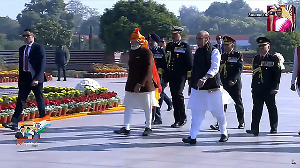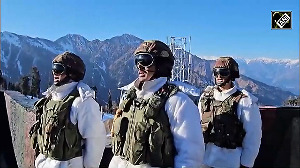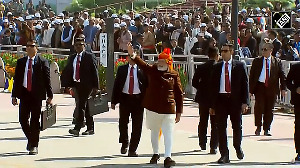As expected, the non-proliferation lobby in the United States -- which has been vehemently opposed to the nuclear deal and has sought to torpedo it, lobbying feverishly on Capitol Hill with Congressman Howard Berman, California Democrat, and chairman of the Foreign Affairs Committee as its key ally and the one who introduced killer amendments during the House debate and vote on the enabling legislation -- lost no time in poking holes in the India-IAEA safeguards agreement.
Daryl Kimball, executive director of the Arms Control Association and the point person in coordinating the non-proliferation lobby's opposition to the deal, told rediff.com that "as we expected, the proposed agreement contains conflicting language on what India might be able to do if it resumes testing and fuel supplies are terminated."
Referring to the preamble where India states that it may take unspecified 'corrective actions' to ensure fuel supplies in the event they are interrupted, he said, it was imperative that the IAEA and its board of governors members "should clarify for the record what these 'corrective actions' India might be contemplating before taking a decision on the agreement."
"If India interprets the agreement as allowing it to remove facilities or materials from safeguards in the event of a fuel supply interruption -- which would only happen in the event that India resumes testing -- it would violate the principle of permanent safeguards over all nuclear materials and facilities," he said, and added, "it would also contradict the requirement established by the US Congress in implementing legislation passed in 2006 that the safeguards last 'in perpetuity and are consistent with IAEA standards and practices.'"
Kimball also complained that "another oddity is that India has not included in the agreements 'annex' its 'declaration' of facilities it would place under safeguards,' and said that by leaving it blank that there could be an interchange between civilian and military facilities that includes its nuclear weapons programme facilities.
He argued, "It is ordinary practice that such agreements list the facility or facilities that would be covered by the agreement at the time the board of governors considers them for approval."
Kimball said, "IAEA members states should not take a decision until that list is made available."
An analysis Jayatha Dhanapala and Kimball co-wrote for the Carnegie Endowment for International Peace expressed wonder that Indian officials also sought exemptions from Nuclear Suppliers Group guidelines that would allow India to possess a strategic fuel reserve that could outlast any fuel cut-off or sanctions that could follow a resumption of nuclear testing.
Dhanapala is a former Sri Lankan ambassador to the US and was president of the 25th Non-Proliferation Treaty convention in 1995.
This contradicts provisions legislation Senator Barack Obama introduced in his 2006 US implementing legislation.
"If NSG supplier states should agree to supply fuel to India, they should clarify that if India resumes nuclear testing, all nuclear cooperation with India shall be terminated and unused fuel supplies from NSG states shall be returned," the analysis said.
It also deemed 'unwise' any acquiescence to India's demand for 'full' nuclear cooperation, including access to advanced plutonium reprocessing, uranium enrichment, and heavy water production technology.
The analysis said IAEA safeguards could not stop such technology from being replicated and used in India's weapons programme.
In an opinion piece in The Wall Street Journal, Henry Sokolski wrote that Manmohan Singh and his supporters have been telling a story in India that is at sharp variance with the one Washington does, among other things saying that the 123 Agreement overrides the Hyde Act and that nothing in the agreement stops India from carrying out a nuclear test.
Sokolski is the executive director of the Non-proliferation Policy Education Center, a non-profit research organisation in Washington, DC, and editor of Falling Behind: International Scrutiny of the Peaceful Atom.
Sokolski also claimed India would issue a statement to reserve its right to expel IAEA inspectors if fuel suppliers suspend nuclear fuel shipments 'for any reason -- including Indian resumption of testing.'
The line he may be alluding to may be one in the text of the India-IAEA agreement that states, "India may take corrective measures to ensure uninterrupted operation of its civilian nuclear reactors in the event of disruption of foreign fuel supplies."
He said India officials could also seek fuel supply guarantees so that it can stockpile uranium fuel if nuclear fuel is cut off following a nuclear test.
"If, as expected, no IAEA board member or NSG country objects to these Indian statements, India will construe the silence as assent," he wrote.
Here, he is possibly reading a subtext in the line that says that India will accept the safeguards to ensure that it gets reliable, uninterrupted and continuous access to fuel supplies from foreign companies, and that it can develop a strategic reserve of nuclear fuel to guard against any disruption of supply over the lifetime of India's reactors.
He admitted that India needs foreign uranium, given that its supplies have run so low that it has significantly cut down power production at its civilian reactors.
This, Sokolski said, was because India's "own uranium production has remained relatively flat, while its civilian and military requirements have risen."
Sokolski claimed that fueling India's civilian reactors is not all about peace, quoting a comment by K Subrahmanyam, former head of India's National Security Advisory board, that India ought to dub many power reactors as civilian facilities so as to conserve native uranium for weapons-grade plutonium production.
Sokolski opined that India was trying to get more weapons to keep up with China, not Pakistan, given that it has been developing intercontinental range ballistic missiles that can carry small thermonuclear warheads. Once an inflow of nuclear fuel offsets the current shortage, India can revisit this plan.
He said the US ought not finalise the deal until either India agreed to stop upgrading its arsenal significantly or if the US is sure that such a move would not matter. He himself leaned for the former option.
Meanwhile, Ambassador Ronen Sen was scheduled to leave for New Delhi this weekend for what sources said was consultations with Prime Minister Manmohan Singh and External Affairs Minister Pranab Mukherjee to discuss the nuclear deal in the wake of the recent developments and the prime minister's meeting with President Bush and to devise a strategy on how to expedite its consummation in Congress if the government of India can rush it over to the US once Washington -- as Bush is supposed to have pledged to the prime minister -- is able to convince the members of the Nuclear Suppliers Group to give the agreement the green light.
They said that Ambassador David Mulford's meetings with some NSG members already in New Delhi was an indication that Washington had already begun this lobbying process and that Bush too in meetings with G-8 counterparts who belong to the NSG had brought up the issue and called for their support.






 © 2025
© 2025